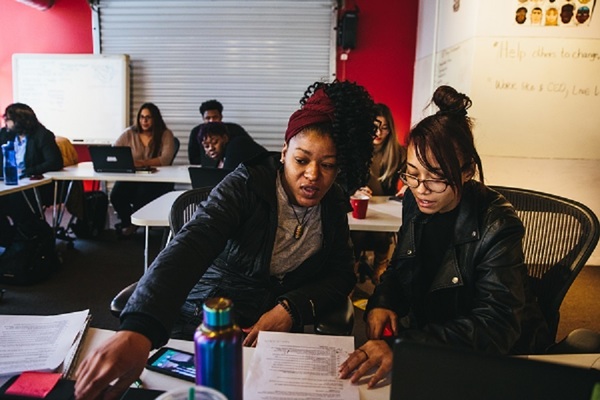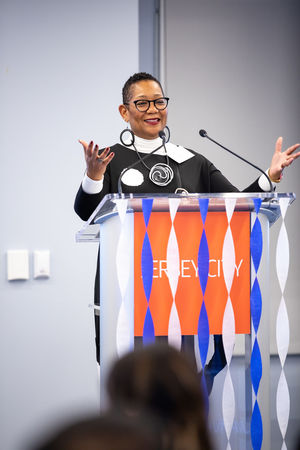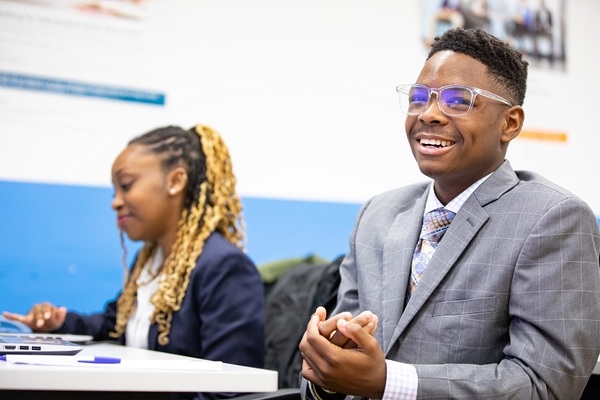
Times of new beginning often go hand-in-hand with a sense of transformation. As we encounter this new decade, we make resolutions—some big, some small, some humorous and unglamorous and others personal and pressing, all in the hope of transforming our lives into a more meaningful and joyful ideal. Whether by setting small goals or taking giant leaps of faith, transformation is the business of change. By committing ourselves to purposeful change, we set out on the journey of transformation, where intentionality, consistency, and moments matter the most.
Even in the midst of this kind of change, LEO’s goal remains the same: an end to poverty. Our research has taught us that this can only be achieved by the transformation of social programs, charitable giving, and ourselves. By investing in innovative and inquisitive partners, recognizing and empowering their expertise, and providing the support of rigorous academic research, we chase an end to injustice and dependence and help drive forward new beginnings for millions of families who are ready to thrive.
In this effort, our partners are our greatest assets—agents of change whose vision, innovation, and commitment to evidence and improvement inspire our work each and every day. They show us that moving people out of poverty isn’t about finding quick fixes, but facilitating transformation. While solving one-off problems may help alleviate poverty, our partners understand that transformation is required to leave it behind.
LEO has launched projects with two new partners who are striving to use research to magnify their impact and transform the lives of those they serve. We sat down with leaders from NPower (New York, NY) and i.c.stars (Chicago, IL) to learn more about the transformative nature of their work.

Kim Mitchell, Vice President of Program Development and Operations at NPower, works to equip underprivileged youth and veterans with the technology skills they need to establish meaningful careers in the IT industry.
“The digital divide is real,” said Kim. “There is a real divide between communities with resources and those without. You can’t even apply for a job today without having access to the internet and knowing how to use a keyboard.”
NPower’s six-month curriculum is designed to give low-income students the knowledge they need to begin a professional career, while also building the confidence and soft skills needed for success in the workplace—and life.
Yet, Kim was quick to mention that it’s not NPower’s curriculum that transforms lives, but rather the unique abilities of NPower’s “nontraditional” students. NPower views underserved youth as having the greatest potential.
“There’s this new term, ‘grit,’ that has recently been coined and basically amounts to resilience,” said Kim. “It’s demonstrated by people who have been left out and left behind.”
While NPower’s students are hungry to participate in NPower’s academic programs, they more importantly want to contribute to the world in a meaningful way.
“They don’t let their starting place define them,” said Kim.
NPower students have the resilience and drive needed to make it in the world. But they often lack the opportunity to do so. And NPower creates that opportunity by developing students’ skills and connecting them with employers. When talking to potential employers, Kim reminds them that the best talent involves skill and heart, and graduating from NPower signals both.
Kim also provided welcome advice for anyone wanting to contribute to NPower’s mission in a broader way. It’s not just about giving money and believing in change, but creating opportunities for those in need and changing the way we think about people in poverty.
“Open doors wherever you can,” she said, “not just your wallets.”
Elizabeth Ferruelo, Chief Revenue Officer of i.c.stars, shared similar insights. I.c.stars offers a technology-based workforce development and leadership curriculum for low-income adults. The program is based on three pillars: rigorous technology and coding training, project-based and applied learning, and “being comfortable with the uncomfortable,” or coaching through conflict.
“It’s more than coding. The theme of our work is teaching transformation. It’s a model that concentrates a lot of resources on a smaller number of participants,” said Elizabeth.
Offered to cohorts of 20, i.c.stars’ curriculum seeks to equip students not only with the technology skills they need to launch successful careers, but also with the leadership and thinking skills they need to thrive professionally. It’s about “learning not just how to respond to questions, but how to write the questions.”
The leadership curriculum at i.c.stars is centered around individual student presentations, called “gifts.” Students are critiqued for the quality of their work, and also on their ability to light up and engage their audience.
“While technology is the tool we teach, it’s very much about confidence and empathy building and teaching people to notice their strengths and biases,” said Elizabeth.
Besides developing mindful and skilled professionals, i.c.stars also builds up its community by engaging its alumni network. It’s not just about transforming the individual, but transforming the community.

“Here, we talk a lot about the role of our alumni. We are not about solving problems for communities, we’re about solving problems with our communities.”
Transformed individuals transform communities. NPower and i.c.stars, Kim and Elizabeth, remind us of the human capacity for belief, the impact of living courageous, compassionate lives, and the opportunity we all have to help weave the social fabric. They live their commitment by partnering with LEO to build evidence about what works to launch veterans, low-income adults, and underserved youth into stable careers and sustaining incomes—bigger, brighter futures. If we seek an end to poverty, we have to transform communities, and we must begin by transforming individual lives.
Whether we are investment bankers, students, mothers, janitors, congressmen, coaches, or economists, we each have an important role to play in this business of transformation.
How we go about our work—how we cultivate our environment and our everyday interactions—is of utmost importance. Our lives, and therefore this world, will only be transformed moment by moment. Where and how we invest our moments will make the ultimate difference in the fight against poverty.
We look forward to joining you and all of our extraordinary partners on this journey of transformation. Here at LEO, we have exciting plans for the future. Together, who will we dare to become? What world will we dare to create?
